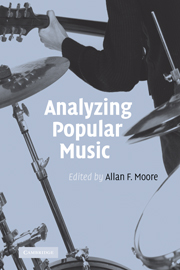Book contents
- Frontmatter
- Contents
- Acknowledgement
- Contributors
- 1 Introduction
- 2 Popular music analysis: ten apothegms and four instances
- 3 From lyric to anti-lyric: analyzing the words in pop song
- 4 The sound is ‘out there’: score, sound design and exoticism in The X-Files
- 5 Feel the beat come down: house music as rhetoric
- 6 The determining role of performance in the articulation of meaning: the case of ‘Try a Little Tenderness’
- 7 Marxist music analysis without Adorno: popular music and urban geography
- 8 Jethro Tull and the case for modernism in mass culture
- 9 Pangs of history in late 1970s new-wave rock
- 10 Is anybody listening?
- 11 Talk and text: popular music and ethnomusicology
- Bibliography
- Discography
- Film/Videography
- Index
7 - Marxist music analysis without Adorno: popular music and urban geography
Published online by Cambridge University Press: 22 September 2009
- Frontmatter
- Contents
- Acknowledgement
- Contributors
- 1 Introduction
- 2 Popular music analysis: ten apothegms and four instances
- 3 From lyric to anti-lyric: analyzing the words in pop song
- 4 The sound is ‘out there’: score, sound design and exoticism in The X-Files
- 5 Feel the beat come down: house music as rhetoric
- 6 The determining role of performance in the articulation of meaning: the case of ‘Try a Little Tenderness’
- 7 Marxist music analysis without Adorno: popular music and urban geography
- 8 Jethro Tull and the case for modernism in mass culture
- 9 Pangs of history in late 1970s new-wave rock
- 10 Is anybody listening?
- 11 Talk and text: popular music and ethnomusicology
- Bibliography
- Discography
- Film/Videography
- Index
Summary
‘One must always try to be as radical as reality itself …’
v. i. lenin, quoted in marcu (1927)How Adorno stands in for ‘Marxism’ in popular music studies
The initial task of this essay will be to argue that Theodor Adorno constitutes one of the single greatest obstacles to developing a Marxist analysis of music. Lest such a contention seem paradoxical, it will be helpful, momentarily, to adopt a certain defamiliarizing perspective, and force oneself to be surprised that Adorno retains such prominence as he does nowadays in popular music studies. Even the most strenuous validations of popular music seem, at some point, out of necessity, to look back to Adorno's shadow and exorcise the weight of his critiques. His well-known, perhaps notorious, rubrics of mass production, standardization, false differentiation, and the regression of listening seem to lie inextricably as a foundational trauma in the discipline; and even those of us, perhaps the majority, in popular music studies who contest his descriptions nevertheless find it necessary to confront them. Promoting a music genre or subculture as political resistance and a disruption of discursive consensus entails explaining how that genre or subculture disrupts the deadening conformity of the music industry. Claiming the progressiveness of a community's reception of some mainstream music involves arguing the productive effects of reception against Adorno's seeming one-way circuit from producer to consumer.
- Type
- Chapter
- Information
- Analyzing Popular Music , pp. 131 - 157Publisher: Cambridge University PressPrint publication year: 2003
- 10
- Cited by

